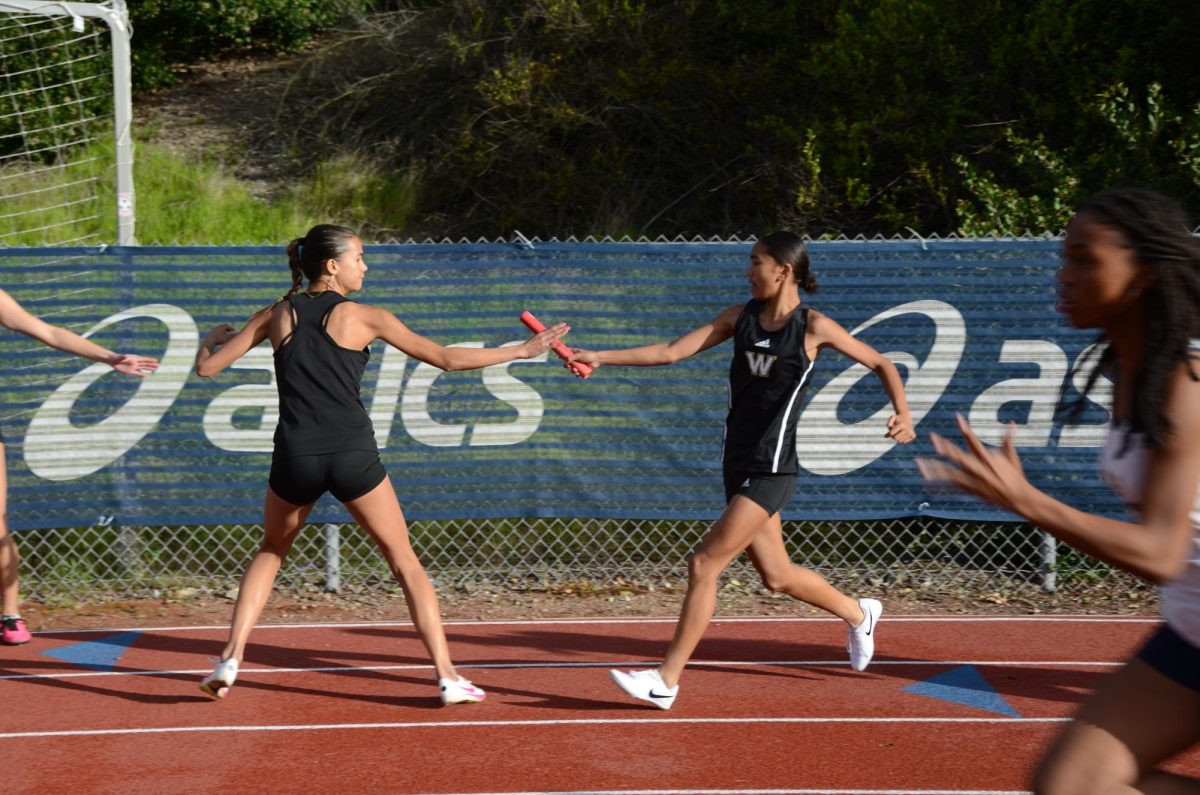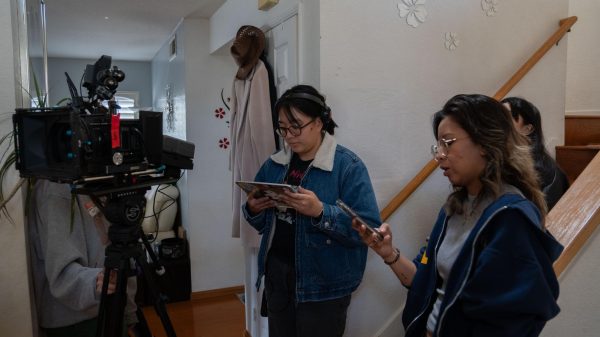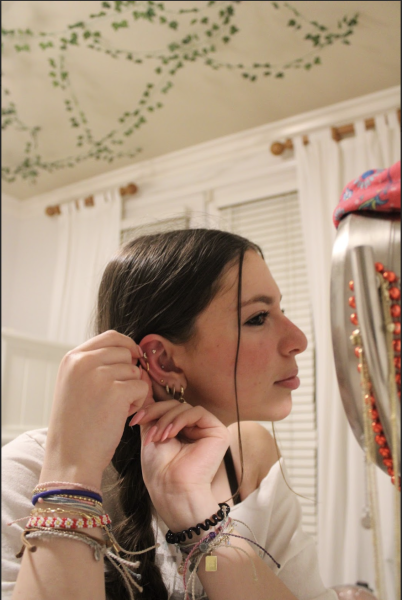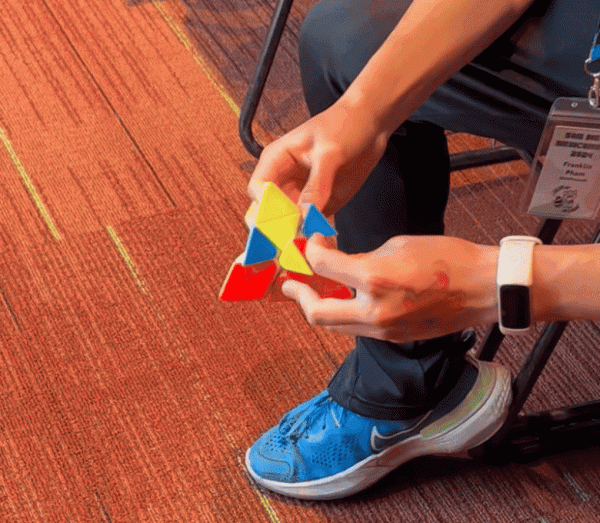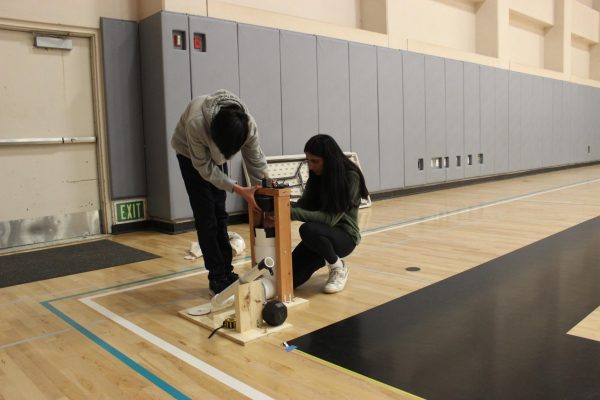Robotics team seniors savor final season
April 7, 2023
Throughout the past five years JJ Siu (12) has been a part of First Tech Challenge (FTC) team Gear Up, many facets of the experience have been variable—the game manual, the robot’s design, Siu’s role on the team. Amid the ever-changing nature of his experience, there’s remained one fixed constant: the dynamic he shares with his teammates.
From playing basketball after weekly meetings to celebrating birthdays at Get Air and even lamenting over college essays together during lunchtime, Siu’s teammates have been there for some of Siu’s most formative experiences in his middle-school and high-school careers. But, at the Regional Championship Competition at Pacific Ridge High School, March 12, the seemingly unalterable constant was about to be forever changed. For Siu and the eight other seniors on the 12-person team, this was about to be their last competition as members of Gear Up.
The night prior to the competition, Siu spent hours in coach Alex Hsu and team members Maya Hsu (12) and Tai Hsu’s (12) garage — the team’s designated practice space for the past four years — checking the robot again and again for any loose screws and rereading lines of code to ensure there would be no mishaps during their rounds. As one of the team’s co-captains, Siu took it upon himself before every round to make sure everything was as it was supposed to be.
“We knew that the smallest mistakes could cost us big time,” Siu said. “Given all the time we put into our robot every year, making sure that everything is in perfect condition is something we always do the night before competition.”
The team’s work and Siu’s final check paid off. In the first three rounds of the competition, the Gear Up robot executed every function perfectly as drivers Tai and Zubin Cheruvallath (12) carefully stacked cones and maneuvered around their other teams’ robots on the course.
With their stable performance in the first half, Gear Up was able to secure third place in the preliminary rankings, which allowed them to select their alliance partner for the playoffs. Gear Up selected Garage Bot, another San Diego-based garage team.
Before the final match, Cheruvallath said the team made an effort to remain calm and collected.
“We treated the match like any other because we wanted to make sure we were doing our best, just like usual, until the very end,” Cheruvallath said.
In the playoffs rounds, the team competed against the other top teams in the region in best-of-three rounds. According to Chervuallath, the level of competition escalated.
“We did well, but us and our alliances went against a team that ended up having the top score in the competition,” Cheruvallath said. “We definitely did as best we could but it’s hard when you’re up against an opponent like that.”
The team placed third overall in the region, just one ranking away from qualifying for the World Championship. While Siu said the team’s final placement was initially bittersweet, he is proud of the team’s accomplishments.
“Given that San Diego is one of the most competitive regions in the FTC competition, I’m happy with how well we were able to do,” Siu said. “San Diego is home of the [annual FTC competition] kickoff and the first year we competed, [our region] had the world champion team, so that really puts into perspective the level of competition we have.”
Siu attributes a large part of the team’s success in the past five years to the added level of dedication required of garage teams. As a garage team, Gear Up manages team funding, recruitment, and acquiring building materials all independent of a school or formal organization.
Growing up, Tai had an affinity for building with Legos and would often spend hours on end digging through buckets for the perfect plastic piece to complete his robots. The only person whose love for Legos rivaled Tai’s was his father, Alex.
Naturally, when Tai expressed interest in joining a robotics team in elementary school, Alex leapt at the opportunity to become an FLL team coach. For three years, Tai was a member of First Lego League (FLL) teams, alongside Siu. By early middle school, Alex convinced his daughter Maya to join the team as well.
After Tai, Maya, and Siu graduated from the FLL program in sixth grade, Alex quickly prepared the team for FTC – the next level of competition. In FTC, the team would trade their block coding for Javascript and their lego bricks for real robot parts from engineering companies.
As the trio discussed FTC in class with friends, their conversations piqued the interest of classmates Richard Tseng (12) and Cheruvallath, whose respective FLL teams had dissolved after elementary school. The two asked to join the team. Maya and Tai reported back to their coach and dad about potentially expanding the team, and Alex invited the children and their parents to his garage to discuss the team’s future in more detail.
To decide whether or not to grant the two admission onto the team, Alex had the remaining FLL members including Siu, Maya, and Tai conduct a formal interview with the two potential members while the parents discussed logistics in another room. The team sat on foldable chairs in the Hsu family garage and questioned Tseng and Cheruvallath about their hobbies and their favorite classes.
“At like 10 years old, what can you really interview someone about?” Maya said. “I remember during the interviews, the parents were already in the other room discussing how the team would work with new members, because they knew we’d let them onto the team.”
To announce Tseng and Cheruvallath’s acceptance onto the team, the members brought out Nerf guns and cheered as they shot blue and orange foam bullets at their new teammates. And with that, the first generation of team Gear Up was formed.
According to Siu, Gear Up’s progression is much like a parabola; for their rookie season, the team had little-to-no idea of what to expect and so Alex took on a larger role of guidance than he did in subsequent years.
“The parents’ approach to it was to let us try everything and to make sure we had a chance to do it all,” Siu said. “They gave us a lot of freedom in that way, and it gave us a chance to discover what we enjoyed early on.”
While Alex was involved with teaching the team about building in programming, he largely gave them the reins in taking risks and creative liberty with their choices.
As a result, the team based the robot’s driving controls off of NBA 2K17, a basketball video game that some of the boys played together, and they nearly named the team “G.O.A.T.s on the Roof”, because they too wanted to be the “greatest of all time” like their favorite team at the time, the Golden State Warriors.
The first time it dawned on Gear Up what they were in for was when they attended the 2018 FTC Challenge Kickoff. While the team wore matching T-shirts featuring a logo they’d designed on Adobe Photoshop, they grew daunted by their opponents who had matching hats or capes.
“Everyone else just looked a lot more prepared than we did,” Cheruvallath said. “They were all coordinated and some teams even had matching jackets, and we just found it really cool.”
In spite of their fears, the team trusted in their preparations and climbed the ranks. After a series of serendipitous robot malfunctions for their opponents, the first-year team was even able to outscore the defending world champions at the time at their first meet. By the end of the season, the team failed to achieve a top-four regional ranking to qualify for the world championship, marking the end of their first competition season.
However, weeks after the end of their first season ended, Alex received an email from the FTC committee informing him that Gear Up’s first season wasn’t quite over. As part of a lottery, Gear Up was selected as a wild card team to compete at the 2018 FTC World Championship. At the time Alex forwarded the email to the team, Tai, Maya, and Cheruvallath were riding the school bus home together and recalled getting dirty looks from seatmates as they all whooped and cheered.
For four days, the team, accompanied by their parents, competed in Houston. On the Spirit Airline flight to Houston, the members booked seats right next to one another while the parents sat in the row in front of them. Meanwhile, their robot sat inside a wooden crate that the team had stuffed with foam blocks. At the world championship, the members met teams who spoke different languages and whose robots were brightly colored and adorned with flags. By the end of the experience, Siu said it became a goal in everyone’s minds to return to the world championship in the next season, this time as qualifiers.
However, while a parabola curve starts at a peak, it soon dips down into a trough — similar to the one Gear Up encountered in their second season. As Alex stepped away and allowed the students to take more initiative for themselves, the team faltered in their second season and failed to qualify for regionals. Thereafter, the FTC committee tightened their regulations to only allow two World competitor teams from the San Diego region, and Gear Up tightened their ship accordingly.
Approaching their third year, the team began assigning roles to each member. Maya spearheaded project management while Cheruvallath specialized in computer-aided design (CAD), Tseng in outreach, and Siu and Tai continued with driving and programming.
With new structure within the team, the parabola had begun making its ascent once again.
In Gear Up’s third, fourth, and fifth seasons, they consistently ranked in the top 12 at regionals, with their third-place finish this season being the highest they’ve ever ranked.
Seeing that the only members from the original Gear Up team will be graduating this season, Siu and the team have focused a portion of their efforts this year on building up the next generation of the team.
“We want to see this team continue, so we’ve spent a couple years looking for underclassmen who could join and carry on the team,” Siu said.
Currently, the team has three freshmen who hope to return for another season next year.
Liam Doran (9), one of the three, said that he anticipates a year of rebuilding for the upcoming season.
“We’ll be a very different team from what we are now, and we’ll just have to come to terms with that,” Doran said. “It’s going to be difficult losing the core of our software team and people who’ve had so much experience, so we’ll just have to work on bridging that [gap].”
As for Alex, although his own two children will no longer be on the team, he plans to continue being the coach of the team and intends to keep hosting the weekly practices in his garage.
In some ways, Cheruvallath says that the new members possess a quality that reminds him a lot of the Gear Up team when they first began. Perhaps he sees himself in Doran, who brings a stuffed shark to all the competitions, or perhaps he sees himself in Julian Wu (9) and Miles Lin (9), who insist on pushing the team’s robot around on a dog bed because it’s shock-absorbent and because they find it funny.
While there are some traditions Doran doesn’t intend to keep, like the NBA 2K17-inspired driving controls, there are other parts of the team—like the openness and close-knit community—that Doran hopes to preserve.
“They were all so welcoming to me from the start and they were so willing to help me learn new skills,” Doran said. “I want to keep that with the team next year, where me and the other freshmen will become the mentors to the new members we’ll recruit.”
As of now, while the original Gear Up members, whom Doran affectionately refers to as the “senior citizens,” are still around, Doran said he hopes to ensure that he’s learning as much as he can for them as the team gears up for the next season.


